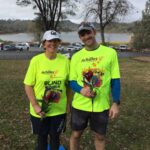For Rosie Holliday, being active and adventurous were two traits her parents modeled for their children. As a teenager, she was always encouraged to participate in sports, and if she wasn’t playing on a team, she was in the garden kicking around a football. Growing up with an enthusiasm for sport, it’s no surprise Rosie chose a career tied to being active and is a high school physical education teacher.
Currently living in a small village outside of Carlisle, England, Rosie’s home is just four miles from the border of England and Scotland, a location famously marked by Hadrian’s Wall and, as luck would have it, Hadrian’s Path is a great place to run. This is where she grew up, and this is where she returned to after a six-month stay in the United States and her college years at the University of Edinburgh.
Although Rosie ran cross country in high school, she was more of a team sport enthusiast, playing netball, football, and field hockey. She actually shied away from cross country because, during one of her early high school races, she exerted herself so hard that she vomited after crossing the finish line. That experience didn’t immediately bond her to running. It never occurred to her to join a running club at university, and she never envisioned that running fifty-mile races would be in her future.
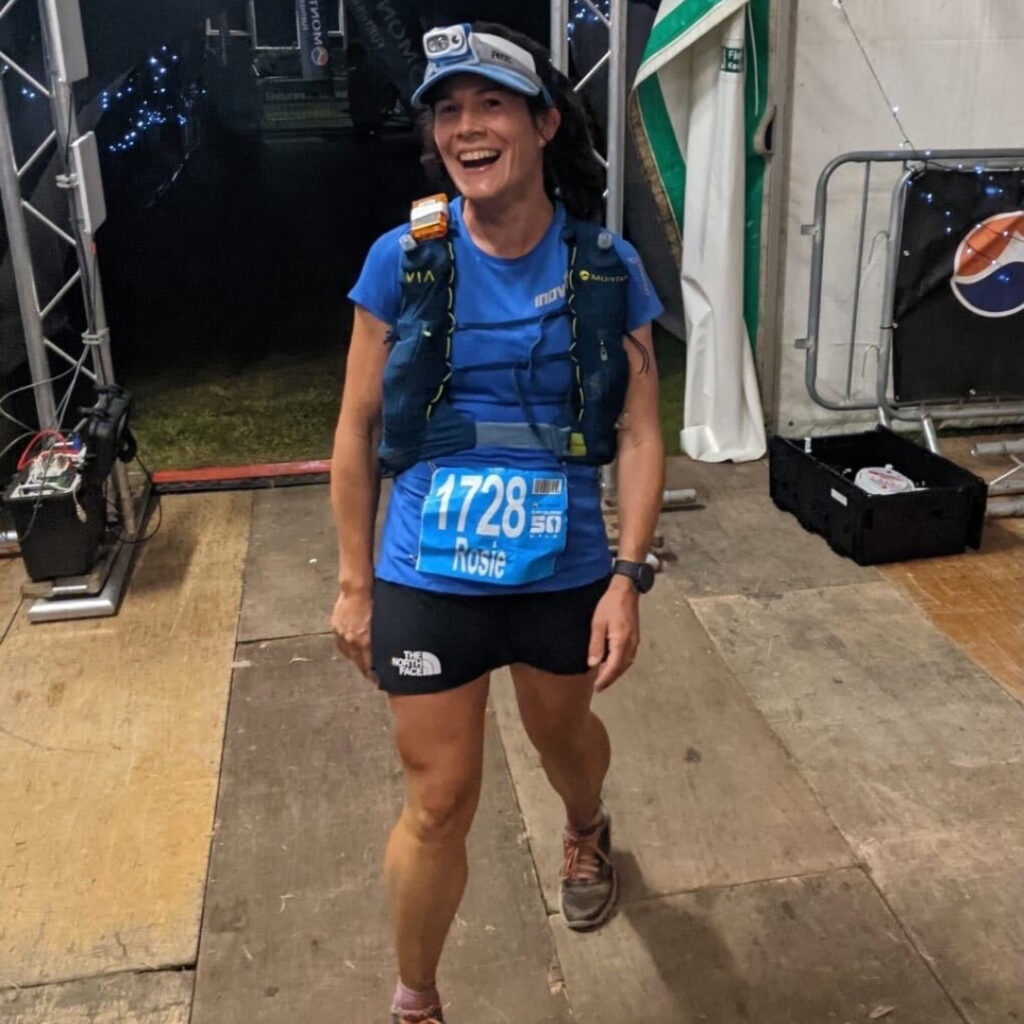
Remaining active after college, Rosie played club team sports late into her twenties and even met her husband because they were on the same club team. During this time she also started running on her own. As she approached her thirtieth birthday, Rosie wanted to mark the milestone by running thirty miles and signed up for the Kielder 50-kilometer race. Having a sibling who was also active and adventurous, her sister joined her. With a very relaxed and unstructured build-up, Rosie finished in just over six hours. She viewed the experience as a day out with a sibling, where the two ate snacks and enjoyed the friendliness of everyone on the trail. To Rosie, running was just another way to get outside and explore. Still, she didn’t immediately jump into another ultra-distance race. Instead, she ran shorter distances regularly, including participating in weekly Saturday morning Parkrun 5-kilometer events. These weekly walk/runs are both timed and free to everyone, and Rosie credits her love for running to the Parkrun atmosphere.
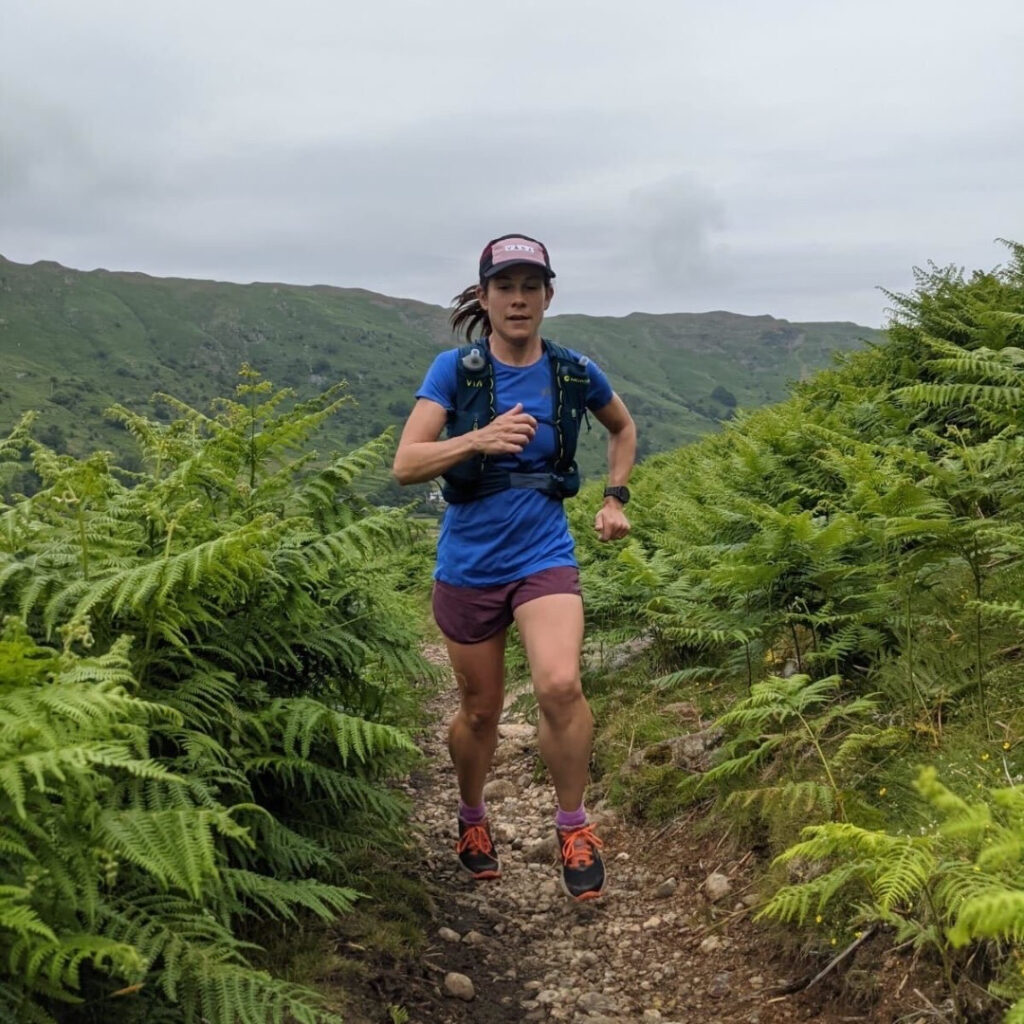
At a crossroads with running and field hockey, Rosie found the social aspects of the running community more enticing than the purely competitive nature of team sports. Slowly she started to show up late to field hockey practice because she was out on the trails. At the same time, Rosie’s then-boyfriend, now husband, began to run more, entering his own 50-kilometer race. Finally, out of boredom and an eagerness to push her boundaries, she left her club team to focus on running.
Rosie’s interest in ultra distance solidified, when two weeks before their wedding her husband ran his first 100-mile race. She crewed for him that day and was intrigued by how many seemingly average people were running the ultra-distance – all still pushing their personal limits. Just like at Parkrun, Rosie was hooked by the comradery. She loved how everyone supported each other, and connected with the mindset of seeing what each individual could do. Motivated by her experience crewing her husband, Rosie registered for the Lakeland 50-miler. While Rosie wanted to test the boundaries of what she could accomplish physically, she wasn’t one to stress out about her training. She was content with a more low-key approach to preparing for a long-distance effort. That said, as part of her build-up, she ran the Kielder 50-kilometer race a second time and was surprised when she finished seventh female, lowering her time by more than an hour. The performance was a psychological boost. While she didn’t consider herself a super serious runner, she saw improvement.
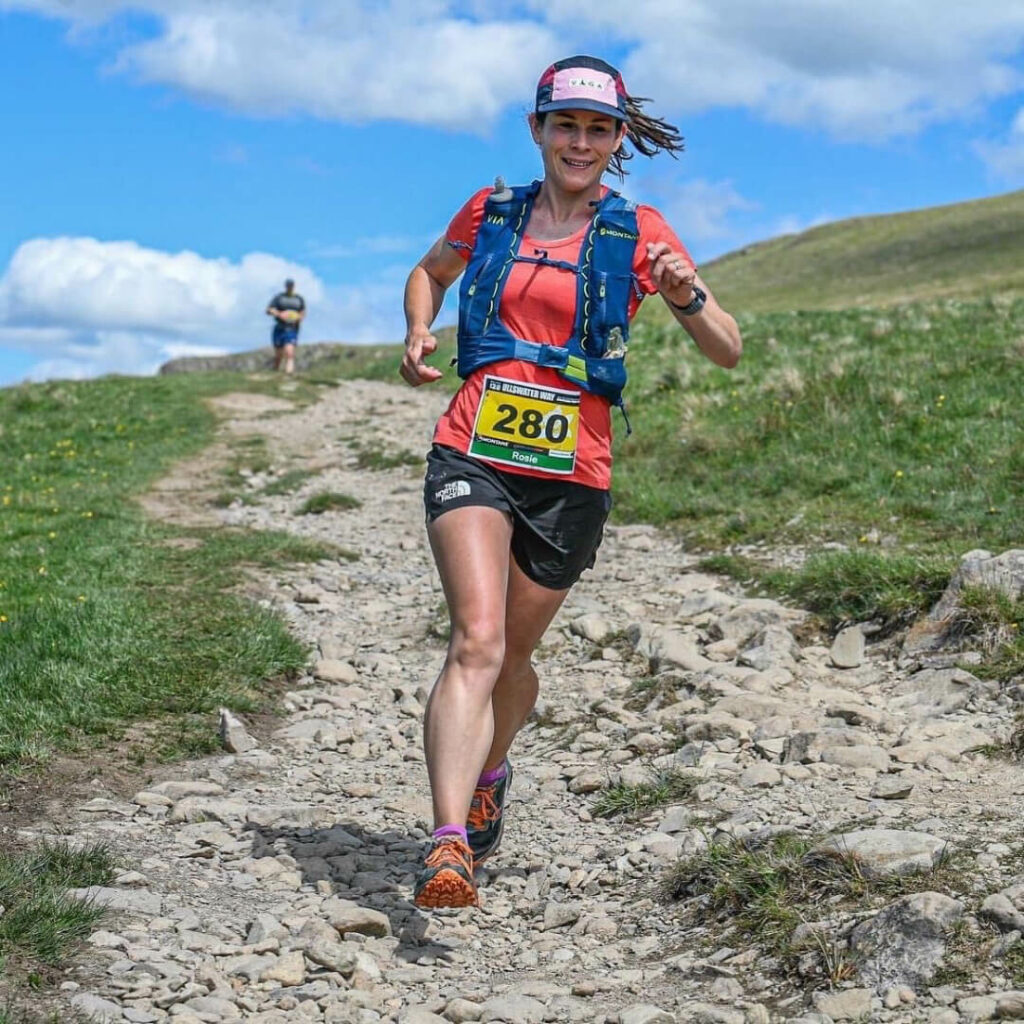
Rosie’s build-up to the Lakeland 50 also included two half marathons and a 10-mile trail race, all run within a week. Then, six weeks before the race, and almost at peak fitness, Rosie found out she was pregnant with her first child. She wondered if it was wise to run the race and discussed the implications with her parents, who were both in the medical field. With their support, the fact that her husband was also racing, and that her sister agreed to run with her, Rosie decided to go forward and participate as planned. Her attitude was simple, if things got too hard, or uncomfortable, she’d just stop. So, ten weeks into her pregnancy, she ran and finished her first fifty-mile race.
After completing the Lakeland 50, Rosie’s only goal was to keep running as long as she felt okay. Through her 28th week of pregnancy, she ran ten to twelve miles a week, thrilled that she was still able to get out and move her body. She never viewed running while pregnant as a big deal – she’d always felt like her belly was an extension of her body, and she ran for herself. Eventually, winter set in, and because she was still working, the ability to run in daylight became a challenge. Fearing a fall on an unseen patch of ice, Rosie cut back her mileage and settled for a walk/run strategy when it was light out. Her approach was fully supported by those in her running club, and fit in well with the idea of Parkrun. In fact, Rosie completed her one hundredth Parkrun event during her 33rd week of pregnancy, an achievement she is very proud of.
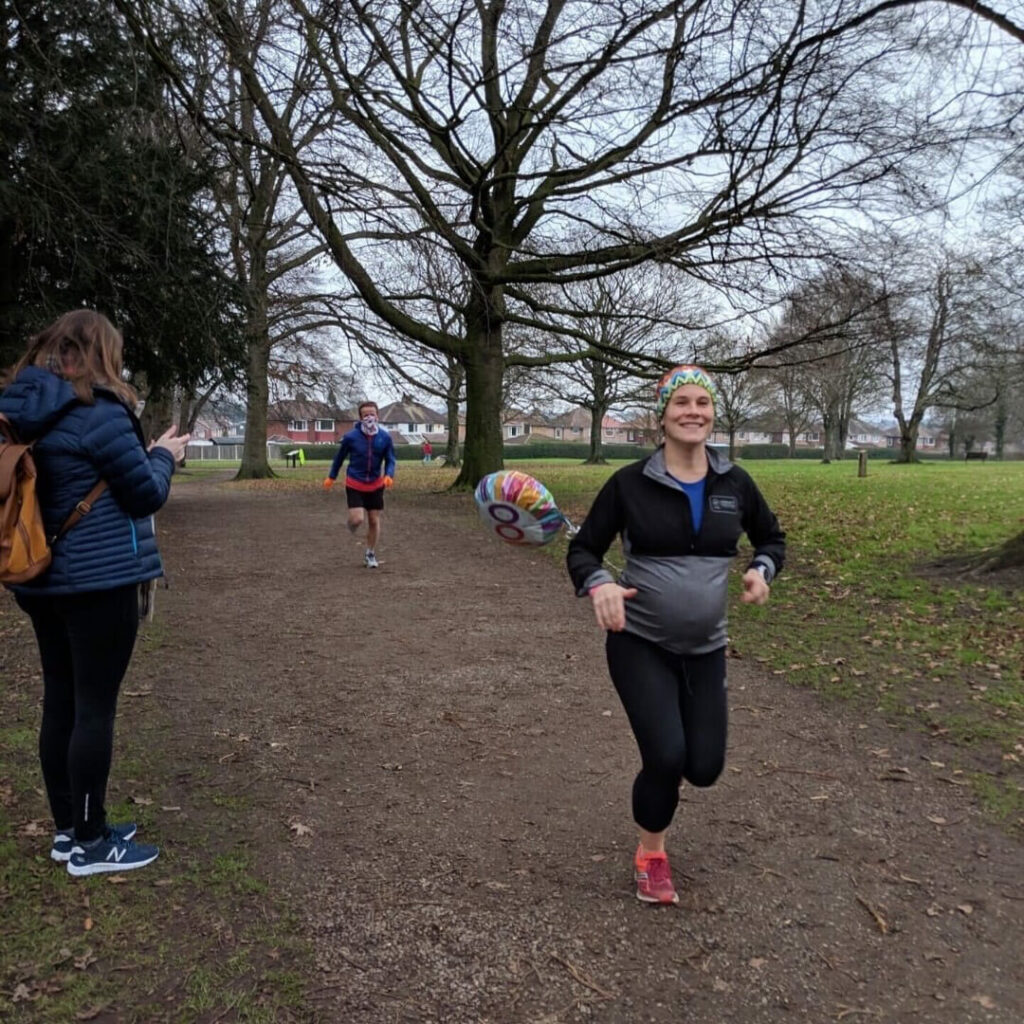
As her due date came and went, Rosie ran through her 41st week of pregnancy. When her midwife suggested she go out for a brisk walk in an attempt to induce labor, she figured she could do better than that, and participated in yet another Parkrun! Ultimately, Rosie had a healthy baby boy via an emergency cesarean section, and believes because she ran right till the end of her pregnancy, her recovery progressed at a surprisingly fast pace. Because she felt so good, she started walking just six weeks after giving birth. Then, feeling like her pelvis and pelvic floor could handle more movement, she completed a 5-kilometer Parkrun at eight weeks postpartum.
Soon thereafter, Rosie began to run a couple of times a week, leaving her son with her husband. Then, four months after giving birth, she ran a trail half marathon. This was when Rosie felt a transformation related to her running. She came to value her time on the trails as a much-needed reprieve from her parental responsibilities, and viewed it as personal time, something that helped her keep mentally fit. To carve out running time postpartum, Rosie had to become more organized when it came to managing daily life and, as a result, her running became much more consistent.
With her running fitness coming along, Rosie signed up for the Cumbria Way Ultra 50-kilometer. At this point, her biggest challenge running a race postpartum was around the realities of breastfeeding an infant. Coincidently, this was around the same time the image of Sophie Power breastfeeding at a UTMB aid station went viral. Seeing the image, Rosie was motivated to figure out something that would work for her. Needing to pump milk before the race, she arranged to have a friend drive to the start, then sat in the parking lot and discretely expressed milk. And because women that breastfeed need to pump at regular intervals, she also stopped at an aid station, went into a back room, ate some crisps, pumped more milk, then went on her way. Again, Rosie had another fulfilling race experience, finishing in about six and a half hours, and was confident she’d be ready to run another Lakeland 50-miler the following summer.
Unfortunately, before she ran her next race, the COVID-19 pandemic mandated an extended shelter-in-place order in England. Having returned to part-time employment after the birth of her son, Rosie was relegated to teaching theoretical principles to her students using online tools. Because her husband was able to continue to operate his business, she found herself home all day with an infant and, if it was possible, running became even more important to her. Since running was the only outlet Rosie and her husband had, they organized their own 5-Kilometer race, one that required a total of seventy-two laps in their garden! Though disappointed she wasn’t able to use her post-partum fitness in a communal race setting, she continued to be creative, challenging herself by racing a virtual marathon from her front door.
When the United Kingdom came out of the initial pandemic lockdown, and with much trepidation about whether they were being reckless, Rosie and her husband entered the Ultra North 50-kilometer race. She set simple goals, to pace for a six-hour effort, and to maintain a fun and high-spirited attitude, she was shocked by her first-place finish. On the course, she never paid attention to her place in the field, only noting that she passed a couple of women. Then, while at one of the aid stations, she found out she was the first female. Her response was simple, she just kept running like she always did.
Unfortunately, the country entered its second pandemic-related lockdown. Desperate to keep her sanity during these trying times, in January 2021, Rosie decided to run 5- kilometers a day for a month. After that, she further tested her fitness by running a half marathon, recording her best time ever. In hindsight, Rosie attributes all her performance gains to having run consistently since the birth of her first child.
When the second lockdown ended in Spring 2021, and training for the Lakeland 50 mile in July, Rosie entered the Howgills Marathon, a race with 5,000 feet of vertical gain. Although her build-up went well, the day before the race Rosie had doubts about her ability to perform, and obsessed about the potential outcome. It wasn’t until she stood at the start line that she felt calm, reminding herself no one cared if she ran well or not, and she was there for the love of the sport. Able to switch to a positive mindset, she had the best run of her life, and experienced the mental state known as ‘being in the zone’. Like at the Ultra North 50-kilometer race, she only found out she was 4th female at the last aid station. When she saw the 3rd woman filling her water bottle, she instinctively sprinted out onto the course. When she crossed the finish line in third, she burst into tears, understanding the reason she raced was to find her limits.
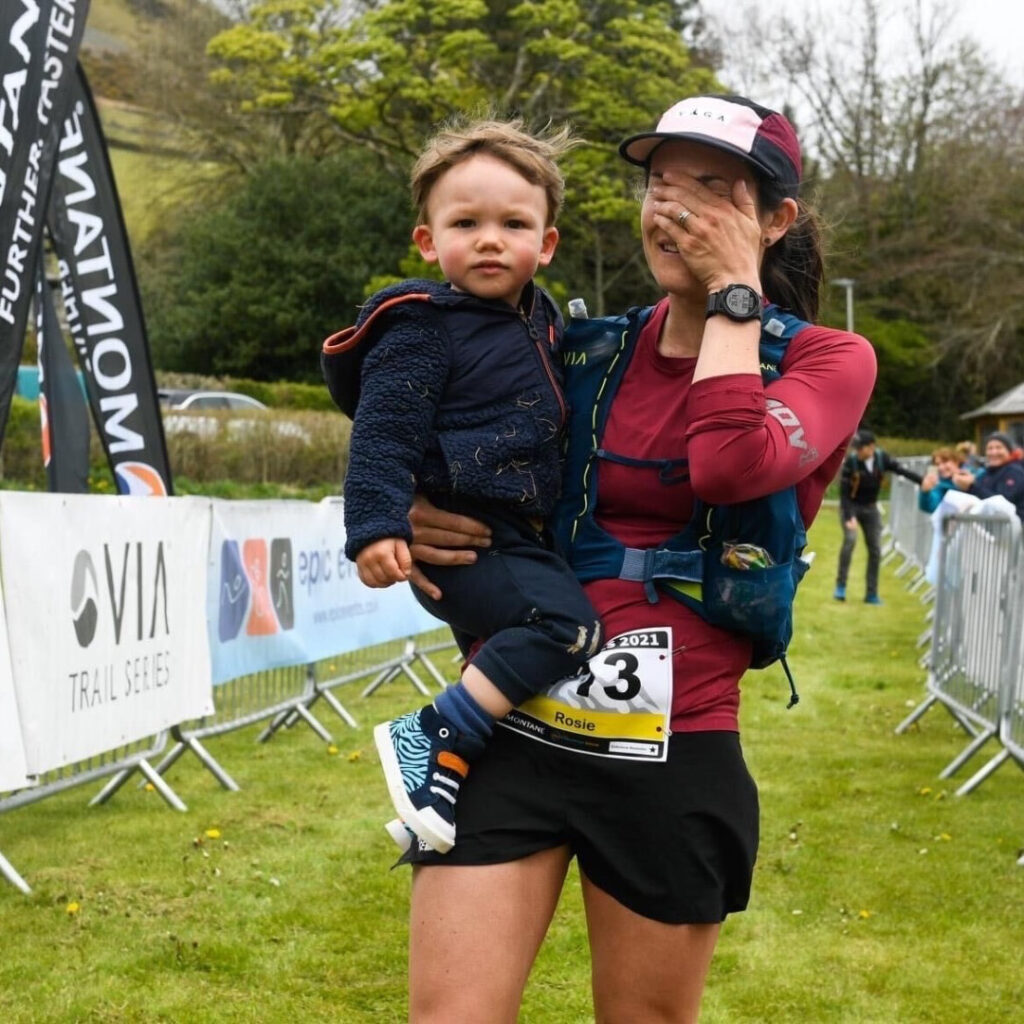
For Rosie, the most surprising thing to come out of motherhood is that she is much more competitive. She never dreamed she would do anything special on the trails after being a mom. But when she goes into the pain cave in the middle of a race, she remembers her thirty hours in labor and knows she can endure anything!
Although Rosie’s progression over the last couple of years has exceeded her expectations, including two sub 11 hour and thirty-minute finishes at the Lakeland 50 mile, there have been more instances where she became too enamored with her place in the field. When this happens, she reminds herself she does this for the love of the run, not her achievement compared to others. After all, she understands running gives her freedom she doesn’t have in other parts of her life.
Several months ago, Rosie cut back on her training mileage. Hoping for a second child, she’d been unsuccessful trying to conceive, and figured she wanted to rule out the impact running might have on her hormones. Whether it was from the reduced mileage or not, Rosie is 30 weeks into her second pregnancy. True to her nature, when she was 17 weeks pregnant, and her husband ran the Manchester Marathon, she walked fourteen miles around the course to catch as many glimpses of him as possible. As she did during her first pregnancy, Rosie continues to run. It’s who she is and makes her proud to be a role model. Without running, Rosie wouldn’t have ever known what she was capable of, including someone who isn’t afraid to pump breast milk on the side of a mountain. For Rosie, running has taught her anything is possible.
